

2016-02-16 00:00:00 | 11285 ![]() Print
Print ![]() PDF
PDF
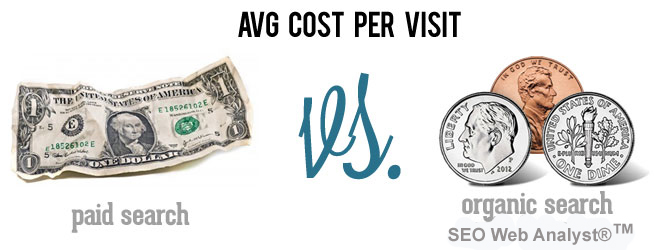
Have got the same buzz question from some clients of mine on this subject matter...asking is SEO better to do than PPC? What is SEO? what is the ROI value? is it measurable? can we run both SEO and PPC campaigns? this and so much more are vast questions that am sure some of you out there are also keen to know and understand.
I will try my best to encapsulate all your questions and further questions with answers driven in this post, I do hope you all find this information quite useful.
Frankly both SEO vs PPC marketing post tend to leave out the buoyant fact that they are two opposite side of the same coin, but first lets start off defining what SEO and PPC means, now according to Wikipedia:
Search engine optimization (SEO) is the process of affecting the visibility of a website or a web page in a search engine's unpaid results—often referred to as "natural," "organic," or "earned" results.
and if you would ask me I will say SEO aka Search Engine Optimization is the "FREE" method of getting your website listed for related niche keywords on searched engines...Simple.
Whereas PPC also know has Pay-per-click (a general term for advert placements on the web) is the use of PAID service to acquire sponsorship, display or listings, while in our case its on search engines for related niche keywords. Note the difference? one is FREE the other is PAID.
Now the irony here is that both parties are under a term we call search engine marketing, again we lookup on Wikipedia for the definition:
Search engine marketing (SEM) is a form of Internet marketing that involves the promotion of websites by increasing their visibility in search engine results pages (SERPs) primarily through paid advertising.
Now that we understand the definition of the two why not have a closer look at their merits and dis-merits?
Image credit upcity.com
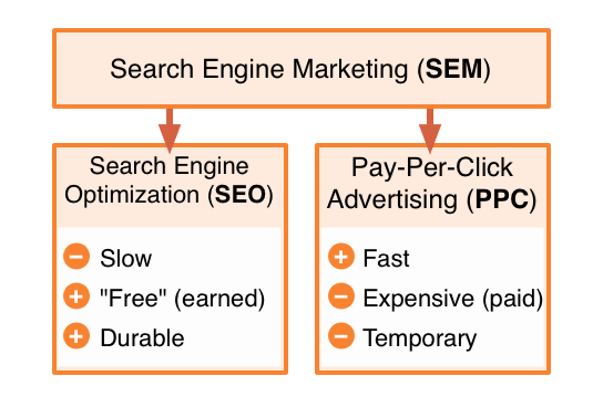
If you take a closer look at the image above you will notice that SEO have got a clear lead, even in terms of click through rates, 80% of search engine users will rather click on an organic search (done by SEO) result than a paid search (done by PPC) result.
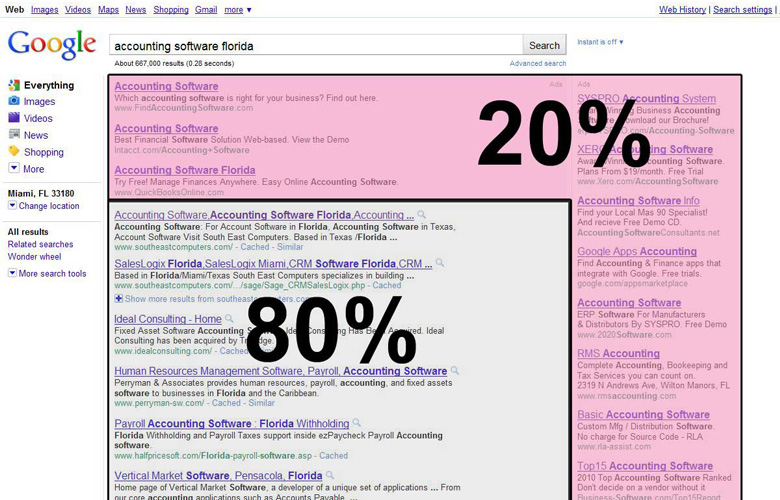
To back this data result up; according to a research by E.Neilson which was published by e-consultancy base on a sample of 1.4 billion searches in the UK in 2011 on Google and Bing, organic results were clicked on more than paid results by a margin of 94% to 6%.
It was also reported on search engine watch in 2011 that search engine users overwhelmingly click on the organic results on Google and Bing by this margin base on trust and previous experience and spending.
This growing trend of behavior has lead to people utilizing SEO alongside PPC, but yet SEO doesn't provide Google or other search engines alike the most money, why would it? it's free, and still yet the value of money spent on SEO is remarkably low to PPC investments. Now PPC makes up for its lack in search shares with ADs Network display, i.e if you include this option in your Adword setup. This are basically banner displacement of images, videos, even text ads on other website networks, but in other to focus on searches (both desktop and mobile) SEO is still King.
Surprisingly most of Google's income and revenues are built on paid advert! yes! 97% comes from online pay-per-click advertising. At WordStream they conducted some research and find out what the most expensive keywords are in Google, ie does billion dollar money making keywords that earn the $$$ bills for Google.
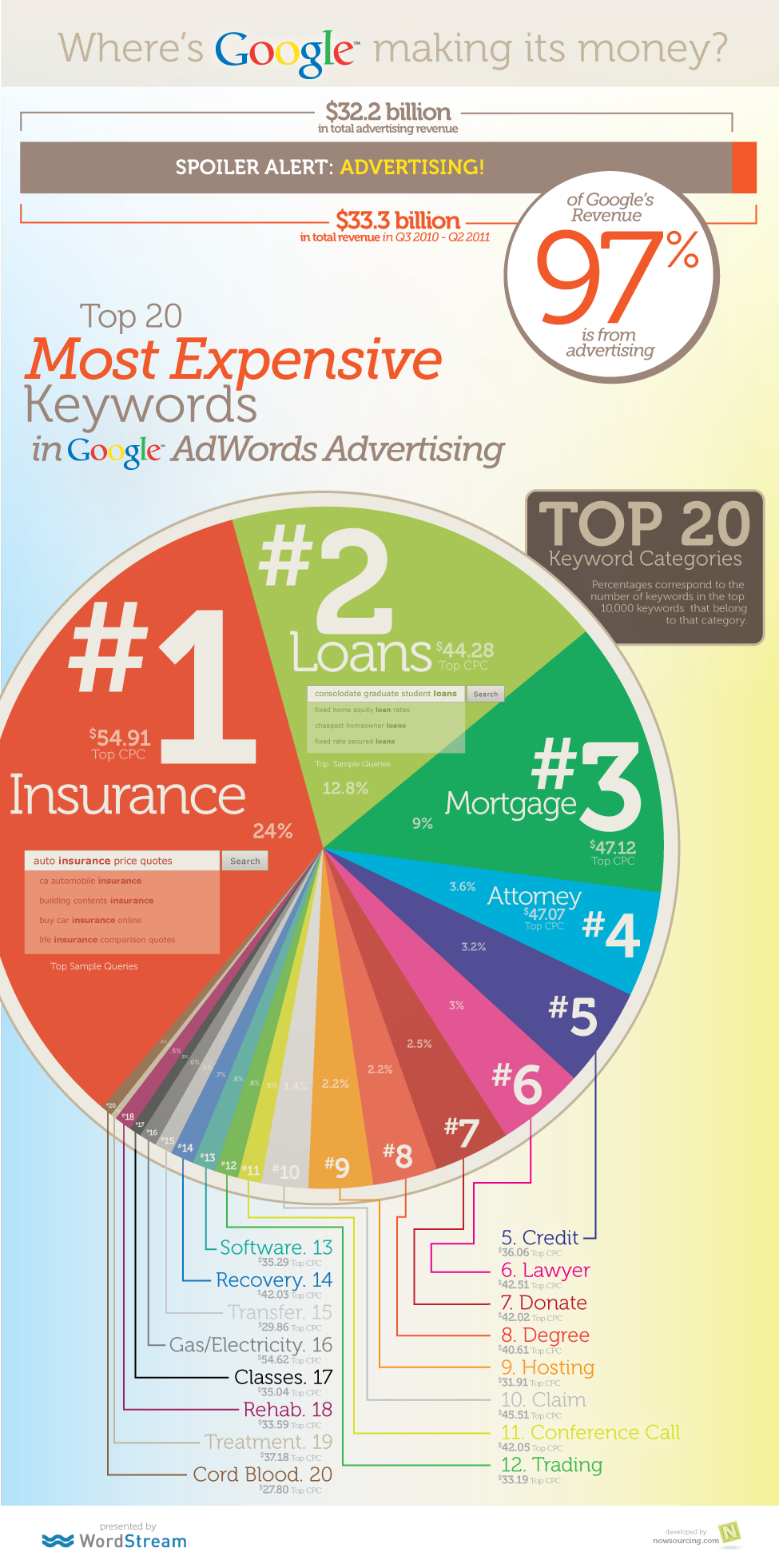
Hope you can clearly see where we are driving at with this discussion? if has stated in our last post that Google is leading the search industry With over 100 billion searches per month (that's 16.67 times bigger in volume than the world's population), CTR (click through rate) is higher on organic results (SEO), but that is if you are on page one of SERP (search engine result page), where the search volumes are NOT evenly distributed. Now if you find your webpage on Page two of SERP, that is the grave yard shift (people rarely visit their to click, may be 1:1000 might, depending if the keyword has above 10,000 monthly search volume).
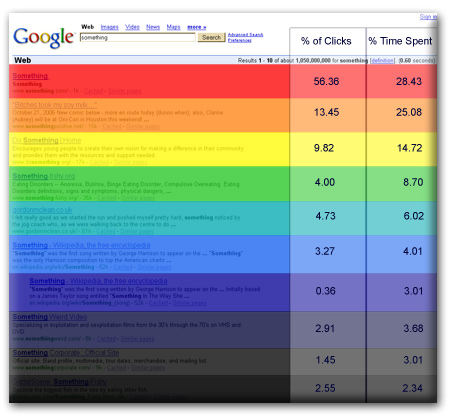
Heat map showing click through rates via SERP.
Please Note: Both Click-through-rates and Time Spent with Bounce rates are very important in SERP even on your PPC (read about this terminologies on How To Analyze Your Website Traffic).
So in a case scenario you are performing both SEO and PPC you tend to wonder if PPC search ads placed do enhance or cannibalize your organic search results... i.e if you are paying for clicks you could have had for free organically? Well this is what Google suggest, that the relationship between paid and organic search is more synergistic than cannibalistic. (Please Note the marked and underline words I have spotted out).
Google recently released its results in a blog post — “Impact of Organic Ranking on Ad Click Incrementality” — including the news that 50 percent of the clicks on AdWords campaigns that occur when the same site is also ranked number one organically are incremental. For example, if a site typically received 100 organic visits from Google from a certain number one ranking keyword and 100 paid visits from that same keyword phrase, the site would only receive 150 organic visits if the paid search ad was paused. So yes, the site ends up paying for some of the visits it could have had organically for free, but it can counterbalance that cost with the additional visits it wouldn’t have received if the paid search ads weren’t running for that keyword. The return on investment for this relationship may be positive or negative depending on the site and the keyword phrase.
So you have read the benefits of executing both SEO and PPC, but will you like to know how this impacts your Lead CTR?
First, pick a single, highly competitive head term, for which the site ranks sustainably in the top 4 and for which there is a history of considerable PPC spend.
A term attracting many thousands of the clicks per day through PPC was chosen (typically over 3k visits per day), making it an ideal test candidate for a CTR impact study.
For 2 days at the end of March, we turned PPC for this high traffic term off in all our major campaigns. The impact on PPC traffic, for this term alone, can be seen below.
PPC turned off for 2 days on 30th March to test impact on CTR
Lets compare the PPC traffic graph above to the CTR and Average Position data for this same head term below…. Discussion on the impact turning off PPC has had on organic CTR follows…
Improved organic CTR lead to rank change the following day
If PPC had remained off, then the organic CTR in first place would have been higher.
By the 2nd of April, PPC was once again running at near previous levels (2.5k a day visitors) for the head term.
Once again, the average position for the head term dropped back to 3.0 and the reported organic CTR had dropped back to 5%.
Our new aim was to determine if there was a ‘sweet spot’ for PPC alongside SEO, so we decided to aim to get the organic CTR as close to 9% as possible. This was the level at which organic rank seemed to improve…
The theory was that a CTR of 9% had been sufficient to improve the average position from third to first at the end of March within a day… (stage 1).
In order to test this idea, we estimated that by reducing PPC spend by half and waiting for CTR results to come through (as shown above), we might be able to improve organic rank once again.
This test started on 4th April and it took until Monday 9th April before we saw improvement in average position. By Tuesday 10th April (one week later), the chosen head term had an average position of 1.2.
One week later, aiming to support an organic CTR of 9% in third place, average position improved. By the next day, the head term was in first place.
Now that the head term is in first place organically and has a reported CTR of 25%, the next step is to increase PPC once more, to see if there is a point at which we lose this organic position and uncover correlations to reported organic CTR.
You can see in the graphs above, that on 13th April, PPC traffic has been increasing and the organic CTR has already dropped back to 12%.
At the time of writing, the head term is still in first place organically and our traffic from organic search looks like this:
Optimizing organic search traffic by dialing down parasitic PPC - a test in progress
There is some cannibalization of search traffic by PPC once more, yet for the time being the head term remains in first place…
We continue to test run PPC marketing at various levels against top organic results, early results suggest that CTR may lead rank change, so there are two important points to consider:
FOOD FOR THOUGHT
Whatever the reason, the PPC advert that you place in #1 must be good else you risk ensuring that the click goes to your competitor. …and… the better your PPC advert, the less clicks your organic result receives.
So, running PPC is not a simple decision. A bad advert can turn people away from your brand, and a good advert will also steal clicks away from your organic result, increasing costs.
If, as is logical, CTR is used in the calculation of position of your URL in the organic SERPs, then by reducing your CTR as a consequence of running PPC campaigns (optimised or otherwise!), you are more likely to drop in search results than to improve.
This now defines the paradox of SEO and PPC.
You might also want to read : Pay Per Click (PPC) Advertising

I am a seo web analyst and have a love for anything online marketing. Have been able to perform researches using the built up internet marketing tool; seo web analyst as a case study and will be using the web marketing tool (platform).
How To Fix Cloudflare Error 522 Connection Timed Out
How To Optimize Cache Performance via HTACCESS Apache Server
How To Fix GA4 Showing Wrong Domain Traffic
How To Reactivate Google Adsense Account
How Do You Write Pitch Deck That Wins Investors
Effective Lead Magnet Funnel Examples For Businesses
How To Promote FMCG Products Using Digital Marketing
The Main Objectives Of SEO in Digital Marketing
How Artificial Intelligence Is Transforming Digital Marketing
Google CEO Sundar Pichai: Search will profoundly change in 2025